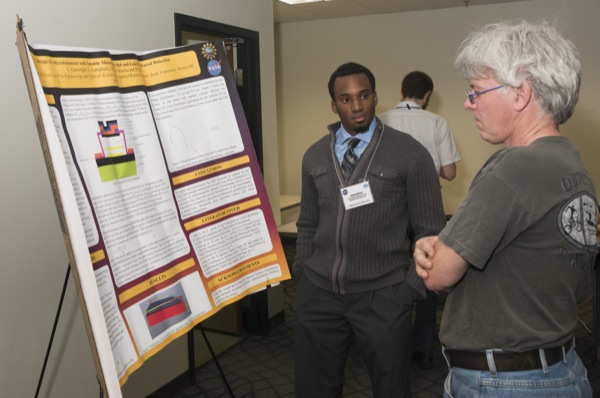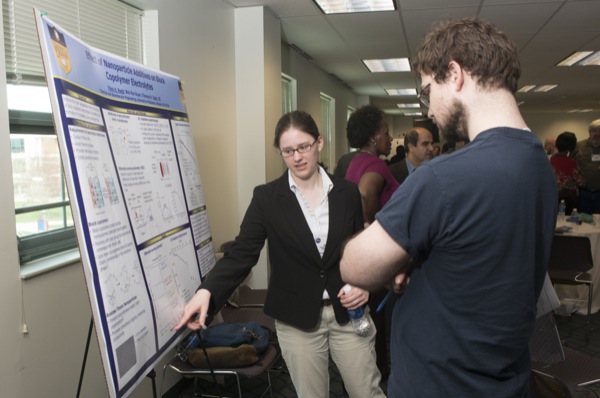


Space Grant
Eighth annual Delaware Space Grant Research Symposium held in Dover
1:02 p.m., May 9, 2014--The Delaware Space Grant Consortium (DESGC), of which the University of Delaware is an affiliate, held its annual symposium at Delaware State University in Dover on April 11.
The symposium highlighted research work that is being done by Delaware students with funding support from NASA.
Research Stories
Chronic wounds
Prof. Heck's legacy
NASA’s Space Grant program was started by congressional mandate in 1989 in order to ensure that NASA would continue to have access to a well-trained workforce of U.S. citizens in the areas of interest to the agency’s missions. These areas include science, technology, engineering, mathematics -- the so-called STEM fields -- and geography.
Each year since 1989, Congress has appropriated up to $40 million per year to NASA to administer the national Space Grant program. Within each state, a consortium of colleges, universities and industrial partners collaborate to award fellowships, scholarships and internships to deserving graduate and undergraduate students in the STEM areas. Space Grant funds are also used for in-service training of pre-college STEM teachers.
In Delaware, the consortium includes the following academic affiliates: University of Delaware, Delaware State University, all four campuses of Delaware Technical Community College, Wilmington University, and Wesley College.
U.S. citizens at any of these institutions are eligible to apply once every year for three types of funding:
- Graduate fellowships (including a stipend of $27,000 per year);
- Undergraduate tuition scholarships (up to $3,000 per year); and
- Summer research internships (up to $3,500 on campus, and up to $6,000 at one of the 10 NASA Field Centers which are spread across the country).
During the current year, consortium funds are supporting seven graduate fellows, nine undergraduate tuition scholars, eight undergraduate summer researchers, and three workshop participants.
At the annual research symposium, graduate fellows and undergraduate research interns present results, either orally or by poster, of the work they have performed under Space Grant auspices during the past year.
On April 11, in the presence of approximately 70 attendees, oral reports were presented by Jennifer F. Biddle, assistant professor in UD’s School of Marine Science and Policy and a recipient of DESGC Research Infrastructure Development funds; by graduate fellows from UD’s departments of Chemical and Biomolecular Engineering, Electrical and Computer Engineering, Materials Science and Engineering, and Physics and Astronomy; from Delaware State University’s OSCAR (Optical Science Center for Applied Research) facility; and by undergraduate researchers from Delaware Technical Community College.
Announcements of opportunities for fellowships, scholarships, and internships are circulated to all affiliates of the consortium in December-March each year.
Information about Space Grant opportunities is available at the website and the Facebook page, and informational flyers are circulated throughout the state via an affiliate representative on each campus.
On the UD campus, information can be obtained from faculty members in the colleges of Engineering (Bingqing Wei of the Department of Mechanical Engineering); Earth, Ocean, and Environment (Xiao-Hai Yan of the School of Marine Science and Policy and Tracy DeLiberty of the Department of Geography); and Arts and Sciences (William H. Matthaeus, Michael A. Shay and Harry L. Shipman, all of the Department of Physics and Astronomy).
For further information about NASA’s Space Grant program in the state of Delaware, contact Cathy Cathell in the consortium office, Room 212 Sharp Laboratory on the UD campus in Newark, telephone 302-831-1094.
Photos by Duane Perry









